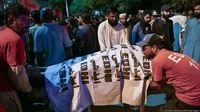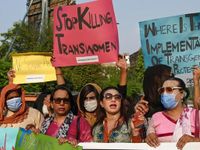In a chilling reminder of the dangers faced by Pakistan’s transgender community, three transgender women were shot and killed on the outskirts of Karachi, the country’s largest city, over the weekend. According to multiple reports from news agencies, including The Associated Press and Deutsche Welle, the victims’ bodies were discovered on a roadside on Sunday, September 21, 2025. All three had been shot at close range, and their bodies were later buried in a local graveyard, as confirmed by senior police official Javed Abro.
The incident has sent shockwaves through Karachi’s transgender community and beyond, drawing widespread condemnation and demands for justice. Sindh Province Chief Minister Murad Ali Shah responded swiftly, stating, “Transgenders are an oppressed section of society,” and vowing that those responsible would be arrested. He ordered an immediate probe into the killings, and police have launched a manhunt to apprehend the suspects. However, as of Monday, the motive for the attack remained unclear, with authorities still searching for clues.
The killings did not occur in isolation. Just two days prior, on September 19, 2025, another transgender woman was critically wounded in a separate knife attack at Karachi’s popular Sea View Beach. The Gender Interactive Alliance, a local rights group, identified the three slain women as Karachi residents who earned their living by begging. The group emphasized the disturbing pattern of violence, stating, “These back-to-back tragedies show that the community is being systematically targeted. This is not just about individual killings, it is an attempt to terrorize and silence an entire community.”
In the immediate aftermath of the shootings, members of the transgender community staged a protest outside Karachi’s state-run Jinnah Hospital, where the bodies were taken for autopsy. The demonstrators, visibly shaken and angry, warned of nationwide demonstrations if the killers were not brought to justice. According to The Associated Press, transgender rights activist Bindiya Rana declared, “If the police fail to identify the killers, we will announce a countrywide protest.” She lamented, “Violence against the community is not new and it is deeply embedded in our society.”
The Gender Interactive Alliance has called for urgent action, demanding immediate arrests, a dedicated police protection unit for transgender persons, and greater solidarity from civil society. Their statement left little doubt about the seriousness of the situation: “This is not just about individual killings; it is an attempt to terrorize and silence an entire community.”
Pakistan’s transgender population, often referred to locally as khawaja sira, has long faced discrimination, violence, and social exclusion. While the country’s Supreme Court recognized transgender people as a third gender in 2009, and parliament passed a landmark law in 2018 securing fundamental rights—including legal gender recognition—activists say progress has been slow and uneven. According to Deutsche Welle, the 2018 Transgender Rights Act was lauded internationally as a progressive step. However, it quickly ran into resistance from religious groups, who argued that the law contravened Islamic principles and threatened the traditional family structure. Key provisions of the act were later revoked by a sharia court, undermining some of the legal protections that many had hoped would offer a new era of safety and dignity for transgender Pakistanis.
Despite these legal advances, the lived reality for many transgender people in Pakistan remains fraught with danger. Discrimination is rampant, and violence is an ever-present threat. Transgender individuals are often among the victims of so-called honor killings, sometimes carried out by relatives to punish perceived sexual transgressions. The Gender Interactive Alliance and other activists argue that these acts of violence are not isolated incidents, but part of a broader pattern of systematic targeting and marginalization.
Shahzadi Rai, a transgender activist and government-appointed local councilor in Karachi, told AFP, “When hate speech and campaigns are carried out so openly, outcomes like this are inevitable. Even though the state and police are on our side, killings are still occurring, which indicates that deep-rooted hatred against transgender people persists in our society.”
The attacks have reignited a national conversation about the safety and rights of transgender people in Pakistan. While some officials have expressed support and solidarity, activists remain skeptical about the pace of change. The protesters outside Jinnah Hospital made it clear that patience is running thin. Their message was unequivocal: justice must be served, and the state must do more to protect one of the country’s most vulnerable communities.
The events in Karachi have also caught the attention of international human rights organizations, who have long criticized Pakistan for failing to protect transgender individuals from violence and discrimination. The United Nations and other watchdogs have repeatedly called on the Pakistani government to fully implement its legal commitments and ensure that perpetrators of hate crimes are brought to justice.
Yet, for many in Pakistan’s transgender community, these promises ring hollow. The Gender Interactive Alliance’s demand for a dedicated protection unit echoes a widespread sentiment that more concrete, on-the-ground measures are needed. Legal recognition, while important, has not translated into safety or acceptance. Many transgender people continue to rely on begging or performing at ceremonies for their livelihoods, facing daily threats and social ostracism.
The recent spate of violence has left the community feeling more vulnerable than ever. As Bindiya Rana put it, “If the police fail to identify the killers, we will announce a countrywide protest.” The threat of further unrest looms large, with activists vowing to keep the pressure on authorities until real change is achieved.
Pakistan’s journey toward equality and justice for its transgender citizens is far from over. The killings in Karachi have exposed once again the deep-seated prejudices and dangers that persist, despite years of advocacy and legal reform. As the investigation continues and the community mourns, one thing is clear: the fight for dignity, safety, and recognition for transgender people in Pakistan is as urgent as ever.




